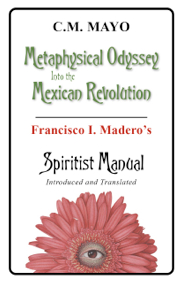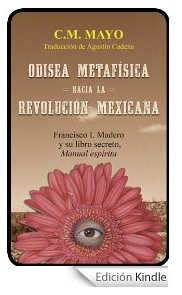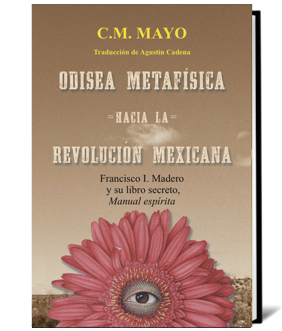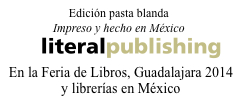
"In
a blend of personal essay and a rendition of deeply researched
metaphysical and Mexican history that reads like a novel, Mayo
provides
a rich introduction and the first English translation of what is
undoubtedly
one of the strangest, most thought-provoking, and utterly fascinating
books ever written in Mexico."
When Halley's Comet, that star
with a quetzal's tail, appeared in Mexican skies in 1910, it
heralded not only the centennial of Independence, but a deeply
transformative episode, the
Revolution launched by Francisco
I. Madero on November 20, what Javier Garciadiego calls "the
true beginning of a process, the birth of the modern Mexican
State."
The great chorus of historians
of Mexico agrees. Yet the deeply held spiritual beliefs that
prompted Madero, a kind-hearted Coahuilan businessman, onto the
battlefield are little known and when discussed at all, it is
more often as titillating gossip than with any attempt at understanding.
What were those beliefs? Some, such as the ideas from the Hermetica,
go back beyond the Renaissance into blurriest antiquity, but
in the main, it was Spiritism, the French offshoot of American
Spiritualism, fused with other late 19th century Anglo-American
and European metaphysics and psychical research, a touch of occult
Freemasonry, and the wisdom imparted by Lord Krishna in the Baghavad-Gita,
an ancient Hindu poem that also enthralled Madame Blavatsky,
Henry David Thoreau, José Vasconcelos, and the leader
of India's Independence movement, Mohandas Gandhi.
In fact, Madero stated his beliefs clearly and in detail in his
Manual espírita, which, astonishingly, he managed
to write in 1910. When he published it in early 1911 as "Bhima,"
and later that year, once elected President of Republic, attempted
to promote it from behind the scenes,
it earned him more enemies
than converts, for it was at sharp odds with the teachings of
the Catholic Church, on the one hand, and on the other, the Positivism
of the so-called científicos, the intellectual elite who
denied the relevance or even existence of supernatural phenomena.
Indeed, his book may have contributed to the visceral contempt
of those behind the overthrow of his government and his murder.
When C.M.
Mayo, a noted novelist, essayist and literary translator
encountered the Manual espírita in his archive
in Mexico's Ministry Finance, she recognized at once that it
was a vital document for understanding Madero and, therefore,
the Revolution itself. As a lark, she offered to translate it
into English, but as she herself admits, "not three pages
in, I was dumbfounded. I had no context for it."
But rather abandon the proyect, she began trying to find that
context, a rollicking odyssey of several years-worth of reading
and "armchair" travel, from the Burned-Over District
of New York to Paris, Barcelona, Brazil, and of course, Mexico,
where she consulted the remains of Madero's personal library—
perhaps one of the finest collections of 19th century esoterica
in Latin America— and as far as examining photos of Australia,
his guayule ranch in the desert where the spirits, so they said,
found it much easier to communicate with Madero.He was a writing
medium.
Whatever one's personal beliefs may be, it would be both unfair
and intellectually naïve to discard Madero's Spiritism as
"mere superstition." His Manual espírita,
published at the behest of the Second Mexican Spiritist Congress
of 1908, is, unabashedly, a religious manifesto and, as such,
has its place alongside the literature of other religions that
emerged at the same time, among them, Christian Science and Mormonism.
In a blend of personal essay and a rendition of deeply researched
metaphysical and Mexican history that reads like a novel, Mayo
provides a rich introduction to what is undoubtedly one of the
strangest, most thought-provoking, and utterly fascinating books
ever written in Mexico.










